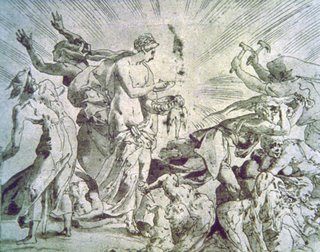Pandora's Box
I guess it's my turn to take up Emery’s offer to blog maybe once or twice a week. In my first entry I thought it would be good to open up Pandora’s Box. Now at this point, good readers, you might just think this a figure of speech, but no, I really am going to open up Pandora’s Box (I can just hear Emery asking himself,” O Sh--! What have I unleashed?”). Relax, Emery it’s not that bad. As you all probably recall, a few weeks ago the L.A. Times broke the story that the US envoy to Iraq, Zalmay Khalilzad, said of the Iraq conflict , "We have opened the Pandora's box and the question is, what is the way forward?" Most are familiar enough with the myth to understand that this was no upbeat assessment, and the press naturally pounced on it. However, it’s worth examining Khalilzad’s comment in greater detail to take note of the ironies and implications of the allusion. The Pandora myth is first attested in Hesiod, an irascible Boiotian farmer of ca. 700 B.C., both in his Theogony and Works and Days. The “box” (really a jar) is only mentioned in Works and Days 53-105. I pick up the story where Zeus is addressing Iapetos’ son Prometheus, who has just pissed off the big fella by stealing fire for man (translation by McLennan):

Then Zeus who gathers clouds addressed him angrily, "You, Iapetos' Son, knowing cunning more than all, with glee you stole the fire and deceived my mind; for you will be great sorrow, and for future men. As fire's price I'll give an evil thing, which all shall cherish in their hearts, embracing their own scourge."
Thus spoke the sire of gods and men, and laughed aloud. He bade Hephaistos, well-renowned, to wet the earth with water speedily, to add both human voice and strength, to make a face like deathless goddesses', a maiden's lovely, charming shape; Athena was to teach the crafts and weaving on the well-wrought loom; and Aphrodite was to bathe her head with grace and difficult desire and limb-fatiguing care; to add a dog-like, shameless mind and thieving ways he charged to Hermes Argeiphontes, to the guide.
He spoke, and they obeyed Lord Zeus, the Son of Kronos. Forthwith from earth the famous Doubly-lame One formed a modest maiden's shape, as Kronos' Son had planned; Bright-eyed Athene then arrayed and girded her; The goddess Graces and august Persuasion put the golden necklaces upon her skin; and then the fair-tressed Hours crowned her head with spring-time flowers; Athene draped her frame with every ornament. The Argos-slaying guide implanted in her breast deceits and wheedling words, the habits of a thief, according to loud-thundering Zeus's plans. And speech the herald of the gods put in, and named the maid Pandora, since all those who hold Olympian homes had given gifts to her, sorrows for hard-working men.
But when the sire had made the hopeless, towering trap, he sent the Argus-slaying, famed swift messenger of gods to bring the gift to Epimetheus, who forgot Prometheus told him to accept no gift from Zeus Olympian, but to send it back in case it be, perhaps, some evil thing for mortal men. But when he took and kept the scourge, he understood.
At first the tribes of men had lived upon the earth apart and free of evils and of tiresome toil and hard diseases, which have brought to men their dooms, because by hardship mortal men are quickly aged. But with her hands the woman raised the jar's great lid, released all these, devising grievous cares for men. Alone there, Elpis [Hope], in her indestructible home, remained within, beneath the lip, nor by the door escaped, because the vessel's lid had stopped her first, by will of aegis-bearing, cloud-compelling Zeus. Among the people wander countless miseries; the earth is full of evils, and the sea is full; diseases come by day to people, and by night, spontaneous, rushing, bringing mortals evil things in silence, since contriving Zeus removed their voice. And thus from Zeus's mind there can be no escape.

OK, so this is obviously another misogynistic Eve story, but even so, the US envoy to Iraq equated the US to the archetypal “evil...scourge... shameless, deceptive... thieving... bitch” (the Greek is better rendered “bitch” than the colorless “dog-like”) who opened a jar that contained ills, unleashing them all upon mankind. Another thing – the alluring Pandora was accepted and enabled by Epimetheus, the dumb brother of Prometheus and whose name means something like “Think-Too-Late” or “Think-After-The-Fact”. I’ll leave it up to you, dear readers, to speculate on the Epimetheus(es) of Khalilzad's allusion. Khalilzad then asks, “What is the way forward?” Well, I hate to break it to the good envoy, but the ills were never put back in the jar once they were released, nor was there any cure for them. Another interesting fact is that the only thing that Zeus kept under the lid was Elpis, or Hope. The two most common interpretations of this interesting detail are that either Zeus kept Hope under wraps because Hope is often mankind’s only comfort and so a good, while others take Hope to be another evil, because it causes only self delusion. Either way, we have no Hope in the world for Pandora’s action, unless we follow the later myth wherein Pandora opened the jar a second time to let Hope out too, in which case we have a Hope that either comforts or deludes us. Yes, I’d say that Mr. Khalilzad has let slip out a pretty good analysis of the conundrum the Iraqi people are facing with the US in Iraq: can’t live with ‘em or without ‘em.

0 Comments:
Post a Comment
<< Home